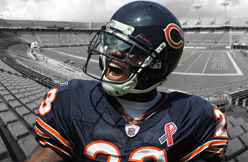Nov/05/12 08:47 AM Filed in:
Devin HesterNASHVILLE -- It turns out the Bears' first quarter punt block call was originally designed for either Craig Steltz or Corey Wootton to get to Tennessee punter Brett Kern, not Sherrick McMannis, who surprised everyone with his strong rush from the outside that led to the block that Wootton returned five yards for a score.
"We wanted to rush them and we knew we could exploit them in some way," Wootton said. "Sherrick did a great job coming off the edge and he wasn't even the guy that was supposed to get the block that we planned in practice. He ended up having a great rush and he got his hands on it and I just picked it up and ran.
"It was either Steltz or myself that was supposed to come in and Sherrick just came in flying he's an explosive guy, an explosive athlete. He made a great play on it. A little Northwestern connection as some may say."
For Wootton, the punt return score marked the first touchdown since he brought back an interception for a touchdown in his junior year at Don Bosco Preparatory High School in Rutherford, N.J.
"I saw the ball in the air and I tried to play basketball and go up and get it," Wootton said. "I held on to the ball and just started rumbling into the end zone. It was a great feeling to get a touchdown and set the tone on special teams."
McMannis has excelled on special teams for the Bears ever since the club acquired the cornerback from Houston in a trade at the start of the regular season.
"When you come out in the game you never know what is going to happen so you just have to go hard and play fast," McMannis said. "The play wasn't designed for me necessarily, but you got to go out and make it happen."
Another element working in the Bears' favor on the punt block was the mere presence of Devin Hester on the field as the return man. Hester believes the fact Tennessee was trying to kick away from him helped give the Bears rush men an idea where Kern would be angling the football when he kicked it.
"When they overload to one side, they kick to that side," Hester said. "So as a returner we start cheating to that side. All of a sudden I’m back there cheating, and they kick it to other side. You got two or three guys blocking and you're overloading one side, you never go back to the opposite side where you’re shorter(-handed).
"No way in our mind did we think they were going back and kick the opposite way. Because when you overload one side, you limit your blocking on the opposite side. We anticipated when they overloaded one side they were going to kick to that side, because you can’t go back because you don’t have nobody to block."
Why exactly do teams do that?
"Trying to kick it away from me," Hester smiled.
Later in the game, Hester almost broke his first return when he fielded a punt and brought it back 44 yards to the Bears' eight-yard line. On the next play Matt Forte rushed up the middle for an eight-yard touchdown that increased the Bears' lead to 14-2.
"It was just a glimpse of us warming up," Hester said of the Bears special teams. "That’s very important to build confidence for myself and the players out there blocking for me. We're still a dangerous return team. We got a lot of opportunities this week and we made those guys pay."

(espn.com)



